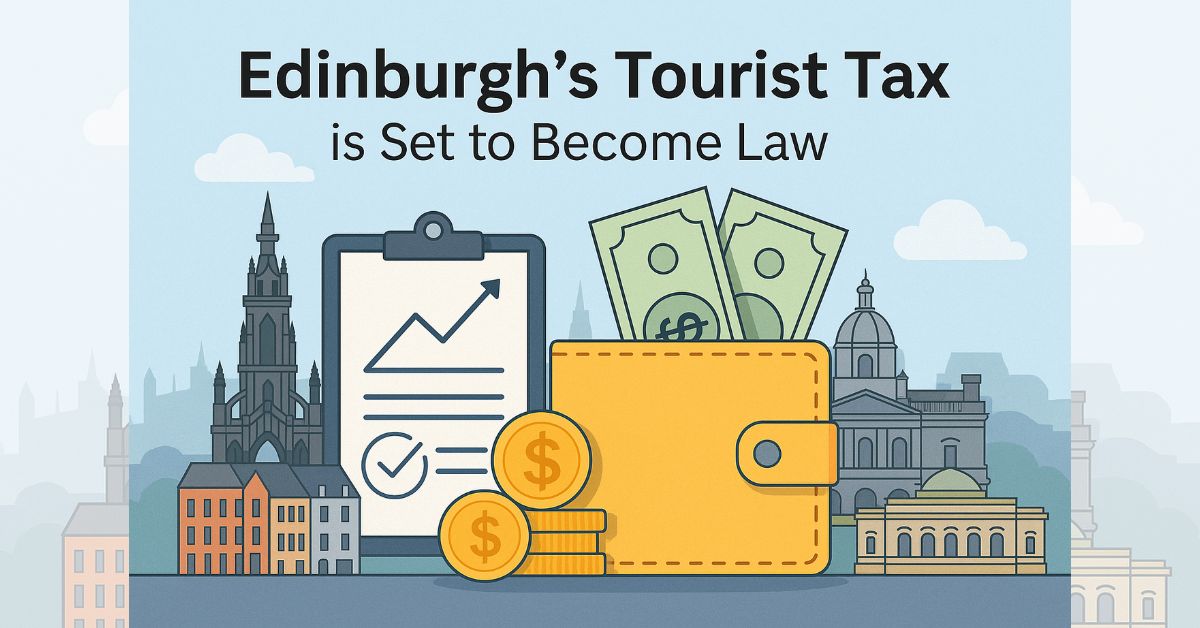When you next book a hotel, Airbnb, or a short stay in Edinburgh, you’ll soon see something new on your bill: a 5% visitor levy charged on overnight accommodation. This move marks a significant shift for Scotland’s capital and has stirred both support and skepticism.
Let’s dig into what’s happening.
What Is the Visitor Levy?
- Scotland passed the Visitor Levy (Scotland) Act in September 2024, which gives councils the power to charge overnight accommodation stays.
- Edinburgh will be the first city in Scotland to apply this scheme.
- The levy is set at 5% of the cost of an overnight stay, applied before VAT and not charged on extras like meals, transport, or hotel services.
- It will only apply to the first five nights of a stay.
- The levy is going into effect from 24 July 2026 onward.
- Bookings made before 1 October 2025 for stays from July 2026 onward will not be subject to the levy.
Which accommodations are included?
The levy will apply across a broad range of paid overnight lodging options, including:
- Hotels, B&Bs, guest houses
- Self-catered flats, aparthotels
- Hostels
- Short-term lets / Airbnb
- Camp sites / caravan sites
- Student lets when rented to non-Edinburgh students / visitors
👉 Planning your next visit? Read our UK Airport Travel Guide for Desi Travellers
Why Is Edinburgh Introducing It?
The city council justifies the levy on several grounds:
- Managing overtourism
Edinburgh is a world-class tourist destination. The levy is intended to help manage the impacts of high visitor numbers on infrastructure, public spaces, and local communities. - Revenue for public services & city improvements
The funds collected will be reinvested in:- Social housing and addressing the city’s housing pressures
- Upkeeping and improving public parks, transport, and tourist infrastructure
- Supporting cultural venues, festivals, and heritage projects
- Enhancing services used by both tourists and locals alike
- Long-term sustainability
It’s not a temporary fee but the levy is intended to be a stable, ongoing source of funding so the city can plan ahead.
City officials expect it could raise £40–50 million annually from around 5.3 million overnight stays.
Reactions & Concerns
While many welcome the idea, there are some reservations, particularly among tourism and hospitality sectors:
- Criticism over competitiveness
Some worry that increasing accommodation costs may push visitors to other UK cities that don’t have such levies. - Complexity for businesses
Hotels, B&Bs, Airbnb hosts, and short-term let providers must update booking systems, pricing disclosures, and collect the levy correctly. - Perceived fairness
Some argue that business travellers, local residents temporarily staying, and low-budget visitors should be exempt or treated differently. - Public pushback
A social media poll cited in an article found 69% of respondents stated “Too much, I’ll stay away.” The Independent
Despite this, city leaders argue that other European cities already have visitor levies without damaging tourism — and they believe Edinburgh will adapt likewise.
What This Means for Tourists & Visitors
If you plan to visit Edinburgh after 24 July 2026, here’s what to expect:
- You’ll pay an extra 5% on your overnight rate (before VAT) for the first 5 nights of your stay
- Expect to see this levy built into the published rates or at booking time as laws require transparency
- It won’t apply to non-accommodation services like meals or tours
- If you booked before 1 October 2025 for a stay in July 2026 or later, you’ll not be charged the levy
- For short stays or if your accommodation bills are already high, the extra 5% might feel more noticeable than for longer, more expensive stays
For business travellers, festival-goers, or people visiting for events but be sure to check whether the levy is included, how your booking is phrased, and whether your provider has made the adjustment.
What This Means for Local Businesses & Communities
- Providers must update booking platforms, pricing displays, and payment systems
- Some small operators (especially those under VAT thresholds) will nonetheless be liable under the levy law The City of Edinburgh Council
- The injection of funds into public infrastructure, housing, and cultural projects may help ease pressures on city services, benefit residents, and maintain Edinburgh’s appeal
- Success depends on accountability and transparency and how the council uses the collected money will be under public scrutiny
👉 Subscribe to our newsletter for business & policy updates
Edinburgh’s move to adopt a visitor levy is a bold one, especially as the first comprehensive scheme in Scotland. While there are valid concerns about cost, competitive impact, and implementation complexity, the goal is to turn tourism into a sustainable force rather than one that strains city resources.
If you’re planning a trip after mid‑2026, factor in this 5% levy when budgeting your stay. And for locals and businesses, this change offers a unique opportunity: for visitors to contribute a bit more, and for Edinburgh to reinvest that into the city we all love.






